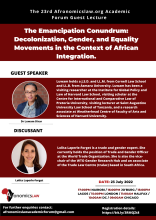Book Review II of The African Continental Free Trade Area Agreement: The Development of a Rules-Based Trading Order
The AfCFTA, which aims at setting up a single market for goods and services ‘from Cairo to Cape Town’, is the subject of the eloquent monograph written by Professor Kufuor. The author, a well-known scholar on African legal affairs, has published extensively, inter alia, on world trade, on (the problems of) African integration and on RECs. Therefore, he is eminently qualified to write about the pan-African ‘Trading Order’.
